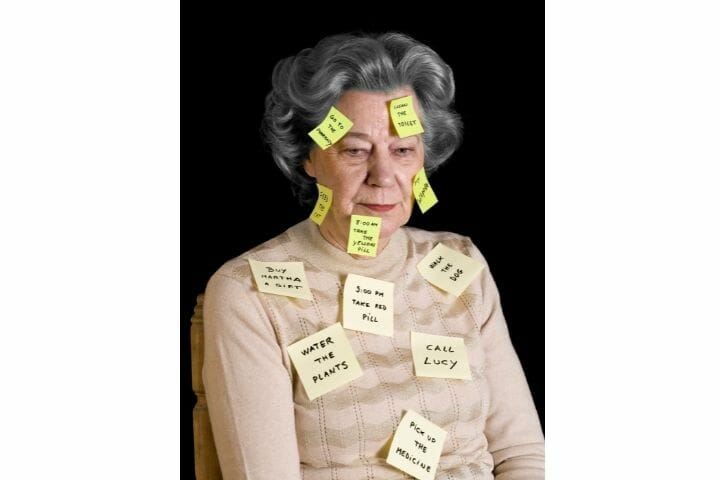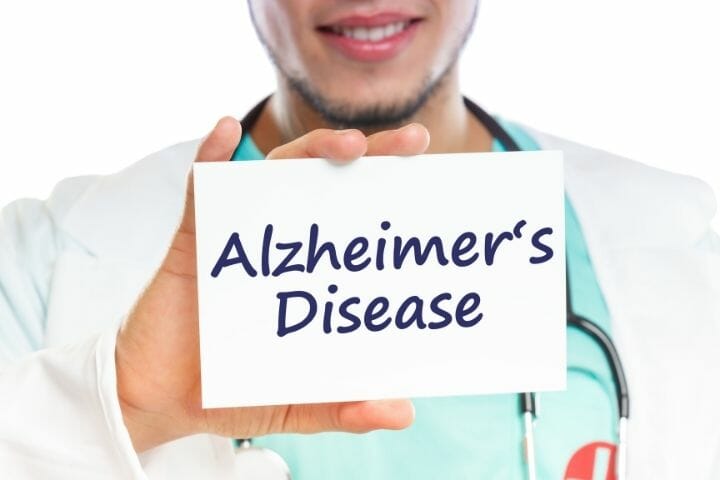Alzheimer’s is a disease that causes loss of cognition, memory, and ultimately complete inability to act. Caregivers need help managing Alzheimer’s, and this guide is there to provide them with everything they need to know about dealing with this disease
Contents
Alzheimer’s is a brain disease most commonly seen in seniors because of aging. It can also be considered to be a progressive neurological disorder. Alzheimer’s causes the brain to shrink due to aging.
It is also a fact that Alzheimer’s disease is one of the leading causes of dementia. Dementia is a disease related to declining memory and thinking abilities. It massively impacts a person’s behavioral and social skills.

Approximately 5.8 mn people in the United States have Alzheimer’s disease and are above 65. This article is a guide for caregivers and seniors who wish to educate themselves about Alzheimer’s disease. It contains a lot of vital information stated clearly so that everybody can understand it easily.
Alzheimer’s Disease
Alzheimer’s disease is a severe condition for which we don’t have any permanent cure yet. It affects and damages the brain, due to which the person is unable to perform their daily chores and activities.
This creates a unique need among these patients for a caregiver. The caregiver is essential to look after them physically and be there for them in an emotional and social capacity.
Alzheimers-Disease-Overview
Every person faces occasional memory loss at some point in time. But the memory loss connected with Alzheimer’s persists for a longer time and worsens with time.
Alzheimer’s disease affects the brain, progressively causing memory impairment. Eventually, the patient loses their ability to carry out even everyday tasks. This creates a need for these patients to have a support staff or caregiver.
Medications have some positive effects on the patients and temporarily improve or slow the worsening of its symptoms. However, there is no final treatment or cure for Alzheimer’s disease.
As a caregiver, you should study the symptoms associated with Alzheimer’s disease. You need to look out for the following signs or symptoms with an Alzheimer’s patient:-
- If the patient is repeating some statements and questions again and again.
- If the patient forgets conversations, appointments, or events.
- Patients get lost or disoriented.
- Trouble finding things.
- Forgetting the names of the people.

State Of Alzheimer’s
Alzheimer’s disease has different stages, and a patient can suffer from any or all of these stages. As a person taking care of an Alzheimer’s patient, you must know about these stages as there are different symptoms and these different stages require different amounts of care and affection.
The three different stages of Alzheimer’s disease are:-
Mild stage
This is the initial stage of Alzheimer’s, where the patient suffers from memory loss. In the beginning, when the patient is unaware of their situation, they are going through a lot of confusion.
The patients may begin to suffer from memory loss and other cognitive disabilities. The initial symptoms include a lot of wandering. There may be some symptoms like getting trouble handling certain things such as money and other daily chores.
Moderate Alzheimer’s stage
This is when Alzheimer’s starts affecting the brain, so the patient has trouble understanding and speaking language, reasoning, and thought processes. The patient is very likely to have difficulty identifying taste and smell.
The memory loss is likely to worsen along with the growing confusion. Some patients may start to lose the memory of their family and loved ones. So it is ideal to keep showing such patients the photos of their family members so that they remember them. This category of patients is more likely to need the aid of a caregiver throughout the day.
Severe Alzheimer’s stage
Alzheimer’s spreads throughout the brain at this stage, due to which their body is on the verge of shutting down. This is the worst state of Alzheimer’s disease, the patients at this stage are near the end of their life, and they mostly spend their day in bed. These patients can communicate in a limited capacity due to which a caregiver is needed to look after all their needs and requirements.
Reality Of Alzheimer’s Disease
There are a lot of myths that revolve around Alzheimer’s disease in general. People tend to believe what they hear or see without doing any research. As a person responsible for taking care of other Alzheimer’s disease patients, it is your responsibility to debunk these myths.
- The most prominent myth regarding Alzheimer’s disease is that memory loss is a natural and inevitable part of aging. This is not true as not every person suffers from memory loss when they grow old.
- Alzheimer’s disease also has a myth that Alzheimer’s disease is not fatal and can be cured. But the reality is it is fatal. Alzheimer’s slowly damages the brain cells, due to which there is loss of memory and eventually death.
- Another serious myth regarding Alzheimer’s disease is that it can only affect elderly and senior citizens. Alzheimer’s can also affect people in their 50s, 40s, and even their 30s. The reality of this situation is that Alzheimer’s can affect a person regardless of age.
Alzheimer’s Impacts Men Women Differently
Alzheimer’s disease affects differently on men and women as, ultimately, it is a brain condition. The brain concentration and design are different in both men and women, due to which Alzheimer’s disease has a different effect on the brain.
The brain suffers from atrophy, or it shrinks when it comes in contact with Alzheimer’s disease. The atrophy of the brain occurs early in women in comparison to men. Women also tend to lose the gray matter inside the brain quicker than men.
Although it is true that both men and women lose gray matter in the brain, they lose it from different areas of the brain. The loss of the hippocampus is more prominent in men than women. Hippocampus is the area of the brain related to cognitive learning and memory.
A finding also suggests that women have more significant volume losses while men have a worse mental function.

Alzheimer’s Aggression
Alzheimer’s aggression is a serious issue where Alzheimer’s patients get angry and lash out for no reason. While looking after them, you will need to be extra careful as they can get angry or irritated pretty easily. As a caregiver, you will have to persist through their anger and tantrums and provide them with proper care.
Alzheimer’s aggression is usually visible during the later stages of the disease. Doctors don’t know the exact reason for Alzheimer’s aggression as it could be a symptom or simply because the patient is disoriented or confused. The best way to get rid of this anger is to indulge the patients in the activities they are fond of.
As a caregiver, you need to understand that these people are not getting angry at you intentionally, but it’s not in their control.
- You should understand what triggers such aggressive behavior in your patient. Most of the time, these triggers are pretty obvious and easily visible. After understanding these triggers, you must try to avoid them so that your patient does not get aggressive in the future.
- This aggression can arise due to plenty of reasons. Lack of sleep and exertion is among the significant reasons, though.
- After sleep, the primary reasons for Alzheimer’s aggression are medication and pain.
- Other triggers that can create anger in Alzheimer’s patients are based on your environment. That can include messy surroundings, loud noises, clutter, too much activity, etc.
- Sometimes the patients might also get irritated when you ask them too many questions or when you don’t give them enough freedom and space.
- There are a few strategies that you can follow to calm the patients down without causing any issues. Forming a strategy or plan beforehand will help you a lot as then you will be ready with your next step and will not act on impulse.
- When the patient is going through a phase of Alzheimer’s aggression, it is ideal for you to talk to them in a very calm manner with a softer tone. If you face any issues while dealing with angry people, you can create some distance between yourself and take a few deep breaths.
- You can also try to comfort the patient with the help of affirmations. You must not tell them that they are wrong. Instead, you can say to them that what they are saying or doing is not accurate or suitable.
Patience is also essential while you deal with such people. Giving them time and space will help you a lot while dealing with them.
Link Between Diabetes And Alzheimers
Scientists and researchers have found a link between type 2 diabetes and Alzheimer’s disease. According to them, the most common link between these conditions is due to the lack of exercise or being overweight.
Diabetes that is not under control can increase the sugar level in the blood to a dangerous level which causes damage to the vital organs in the body.
Diabetes could also be the main reason behind vascular dementia. It is the condition in which memory loss occurs due to brain damage due to less blood flow to the brain. This blood flow to the brain might get reduced as diabetic people often suffer from the thickening of the blood.
Inflammation and blood vessel damage are also among the connections between diabetes and Alzheimer’s. People that have high blood sugar levels can cause inflammation, due to which the risk of heart attack and stroke increases. Inflammation among the blood vessels can also make them resistant to insulin.

Alzheimer’s Care Facilities
Alzheimer’s care facilities are a perfect option for patients in the moderate or later stage of the disease as these are the patients that generally require full-time assistance for a longer time.
Also, take a look at some foods that prevent Alzheimer’s and keep you safe from this chronic and fatal disease.
But before you choose an Alzheimer’s care facility for a patient, you must check their safety and other facilities. Typically there are three types of care facilities for Alzheimer’s, these types are:-
Respite care
In this care facility, the caregivers get a few hours of rest daily. During this time, any family member or friend can take their place. Respite care is of two types: in-home service when the caregiver and the patient both stay at their home. The other type is an adult day care center, where people drop and pick the patient daily.
Residential care
This type of care facility can be tricky and challenging to adjust to initially. For the majority of the patients, it is the right decision as they get the proper care they need at such facilities.
Hospice care
This care facility is mainly designed to treat pain and other symptoms rather than cure a disease. For Alzheimer’s patients, this type of care facility can be used when the patient is at the later stages of the disease. The patients can get enough care and relief to live out the rest of their days peacefully.
Hospice care facilities are readily available at different places. Before shifting the patient to the facility, you can select these facilities by considering their safety and other features such as medical facilities.
Apart from these, the Alzheimer’s patient navigation model offers support to Alzheimer’s patients through community workers known as patient navigators, who provide holistic support outside the medical and care facility.
Sundowners Syndrome
It is pretty normal for people who have Dementia or Alzheimer’s disease to get confused during a specific time of the day. Sundowners syndrome is also commonly known as late-day confusion. Due to this syndrome, you will observe the symptoms in the patient around late afternoon, and these symptoms are likely to continue through the night.
The symptoms will include memory loss and confusion. You will have to carefully study the behavior of the patients as they are most likely going through anxiety, confusion, disorientation, and agitation.

As caregivers, you should remember that the symptoms of sundowning syndrome occur between 4:30 pm to 11 pm. The patient’s condition may worsen during the winter as, during that time of the year, the days are shorter, and comparatively the nights are longer.
As a caregiver, there are some signs you should look out for with a patient suffering from sundowners syndrome:-
- Wandering or pacing
- High anxiety levels
- Hallucinations, confusion, or delusions
- Irritability, agitation, and anger
- Fatigue, pain, or discomfort
Daylight Affects Sundowners
Yes, daylight and the timing of the day affect sundowners. The change in the time may worsen or relax the symptoms of the sundowners syndrome.
This shift in sundown time has a drastic effect on healthy individuals. The change in the timing and daylight will also affect the behavioral, emotional, and cognitive difficulties. As a caregiver or a support staff, you will need to support the patients by helping them adapt to these changes.
According to the Alzheimer’s Association, approximately 20 percent of Alzheimer’s patients suffer from sundowners syndrome. Every person also has an internal clock, and this internal clock is disrupted when the season changes as the days are longer in summer than in the winters.
The changes in the natural light trigger the sundowning syndrome. The timing and the amount of daylight reaching the person complicate things further.

States With Highest Rates Of Alzheimer’s
There are about ten states in the US that have the highest rate of Alzheimer’s disease. These States are the States that have the largest senior citizen population.
According to CDC, it is the fifth leading cause for mortality of older adults above the age of 65 in America.
The states with the highest rate of Alzheimer’s are:-
- Texas
- Utah
- Arkansas
- South Dakota
- Tennessee
- Louisiana
- Georgia
- Washington
- Alabama
- Mississippi
Can Mediterranean Diet Prevent Alzheimers?
According to many researchers, a Mediterranean diet can reduce the risk of Alzheimer’s disease as a Mediterranean diet cleanses the brain. It is said that a Mediterranean diet keeps the age of the brain younger, due to which there are fewer chances of a person who has Alzheimer’s disease.
As a caregiver, you can feed or introduce this diet to your patients to help sustain their condition and not let it worsen with time. A Mediterranean diet also reduces sugar levels and inflammation inside the body.
You can feed the patient a Mediterranean diet and then switch to a standard diet occasionally when the patient feels hungry.
As a caregiver, you can follow the following menu for your Alzheimer’s patient:-
- Give the patient beans, nuts, unsaturated oils, olive oil, whole grains, fruits, and vegetables daily.
- Also, give them fish and other seafood twice a week.
- Swap the salt in your food with different herbs and spices.
- You can also feed them with sweets and meats but in regular portions.

The Art Of Alzheimer’s
The art of Alzheimer’s is an excellent initiative taken by the US government to promote awareness regarding Alzheimer’s disease. This art gallery is at the Seattle City Hall, and it contains artwork made by Alzheimer’s disease patients. A non-profit organization presents this artwork with the support of the UW Memory and brain wellness center.
This Alzheimer’s art gallery aims to show that the people living with dementia also have creative strengths and stories to share. The paintings in this art gallery come from the Alzheimer’s Disease and Dementia community members.
Visitors that visited this art gallery in Seattle had very positive reactions to the art presented on the wall.
Top Alzheimers Books For Caregivers
Books are a significant source of information for the caregivers to know the intrinsic details about Alzheimer’s as a condition. Reading these books will let you know the essential tips and tricks on dealing with Alzheimer’s patients.
Each of the books given in this list will provide you with insight into caring for and dealing with Alzheimer’s patients.
- The 36 hour day:- written by Nancy L. Mace and Peter V. Rabins
- The best friend’s approach to Alzheimer’s care:- written by Virginia Bell and David Troxel
- The forgetting Alzheimer’s: Portrait of an epidemic:- written by David Shenk
- Alzheimer’s primary caregiving:- written by Kathy Laurenhue
- A dignified life:- written by Virginia Bell and David Trexel
Alzheimer’s Awareness
The awareness regarding Alzheimer’s and its effects on the person is growing gradually. America also celebrates the month of November as the month for Alzheimer’s awareness nationally. Many governments and non-government organizations also organize campaigns regarding the awareness of Alzheimer’s.
The primary awareness is done regarding the symptoms of Alzheimer’s and how it changes a person’s life. You may also know about the awareness of the important ways through which you can avoid or reduce the chances of suffering through Alzheimer’s or Dementia.

Alzheimer’s Disease Discoveries
Currently, a lot of discoveries are being made regarding the treatment of Alzheimer’s. There are no medicines or treatments available in the market that can cure Alzheimer’s. There is no cure for the brain cells to recover from this condition.
The deterioration of the brain cells is what causes this disease to progress and worsen with time. The current treatment available in the market may temporarily improve or slow down the symptoms of Alzheimer’s.
Preclinical trials are being done on people so that researchers can find an effective cure. Even the caregivers for Alzheimer’s patients can participate in the research regarding the treatment of Alzheimer’s.
Tell Us Why You Want To End Alzheimer’s
Alzheimer’s disease is a severe condition that affects more than 50 million people worldwide. This condition has no effective cure or treatment. Ending Alzheimer’s disease will allow these people to enjoy their old age and live their life to their fullest.
The current treatment available can only reduce the symptoms or slow them down. Finding a proper cure to this condition is the need of the hour, due to which plenty of researchers are now working on a cure for Alzheimer’s disease.

Wrap Up
Alzheimer’s disease is one of the severe diseases affecting cognitive functioning. It mainly affects your loved one’s communicating and thinking ability. People affected by Alzheimer’s quickly start forgetting things and even forget the situations they have been a part of.
However, it is not challenging to identify the onset of Alzheimer’s. Simple hints like sleeping problems or behavioral changes and symptoms like swelling, fever, pain in the body, or loss of sensing abilities are some of the initial indications which will tell you that you need to see a doctor as soon as possible.
